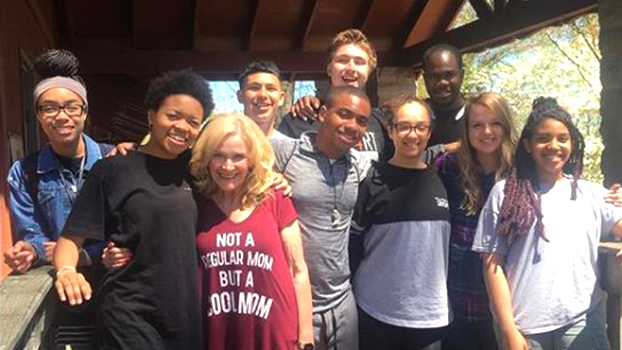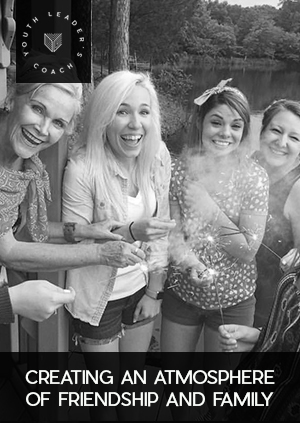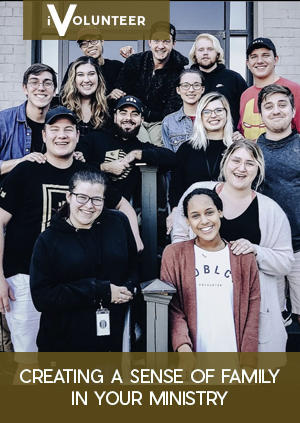Creating A Family Feeling
Once upon a time, a well-meaning Sunday school leader declared to the teenagers that showed up Sunday morning after Sunday morning, “You guys are going to like each other or else we’re going to die trying to make you…” The truth is many of us have felt like we’ve already died trying. Creating a family feeling in our youth groups is easier said than done.
If you have more than a dozen or so teenagers, there are probably at least two cliques that have emerged or are emerging. Even among those cliques, there are always dating issues, friend squabbles, the list goes on. We are required to teach our teenagers that we are to love our neighbors like ourselves, but at the heart of many of these cliques is individual insecurity. The sad reality is many of these teenagers don’t like themselves. So how do we get them to like each other?
First and foremost, we must pray for these students to get along, but we must also be strategic in our efforts to get our youth groups to begin to not only call each other family but act like it. One great way is to plan an “outing” and invite a key influencer from each of the “cliques.” After a few hours together away from their respective “groups,” they may find they actually have something in common.
Below are some tips to creating an effective connection:
- Make this something that you don’t publicly advertise to everyone else in the youth group.
- Make it fun and upbeat, but before it’s over specifically address the issue. Explain to them how important it is that your group feels like a family and a place where everyone feels safe.
- Bring them on your team – tell them you need their help. Ask them to purposefully talk to someone different each week and to go out of their way to get everyone to sit together.
- Use positive language such as, “It would be so cool if you would…it would help out so much if you would…”
- Follow–up with these individuals and make them your “check points” as you see things going well or not so well.
- Remember, what gets rewarded gets repeated! Desperately try to catch them doing exactly what you wanted them to do and write them a note or tell them how amazing they are!
Once upon a time, a well-meaning Sunday school leader declared to the teenagers that showed up Sunday morning after Sunday morning, “You guys are going to like each other or else we’re going to die trying to make you…” The truth is many of us have felt like we’ve already died trying. Creating a family feeling in our youth groups is easier said than done.
If you have more than a dozen or so teenagers, there are probably at least two cliques that have emerged or are emerging. Even among those cliques, there are always dating issues, friend squabbles, the list goes on. We are required to teach our teenagers that we are to love our neighbors like ourselves, but at the heart of many of these cliques is individual insecurity. The sad reality is many of these teenagers don’t like themselves. So how do we get them to like each other?
First and foremost, we must pray for these students to get along, but we must also be strategic in our efforts to get our youth groups to begin to not only call each other family but act like it. One great way is to plan an “outing” and invite a key influencer from each of the “cliques.” After a few hours together away from their respective “groups,” they may find they actually have something in common.
Below are some tips to creating an effective connection:
- Make this something that you don’t publicly advertise to everyone else in the youth group.
- Make it fun and upbeat, but before it’s over specifically address the issue. Explain to them how important it is that your group feels like a family and a place where everyone feels safe.
- Bring them on your team – tell them you need their help. Ask them to purposefully talk to someone different each week and to go out of their way to get everyone to sit together.
- Use positive language such as, “It would be so cool if you would…it would help out so much if you would…”
- Follow–up with these individuals and make them your “check points” as you see things going well or not so well.
- Remember, what gets rewarded gets repeated! Desperately try to catch them doing exactly what you wanted them to do and write them a note or tell them how amazing they are!
Related Items
If your calendar could speak, what would it say? If you look at a typical youth pastor's weekly schedule, often times you'll find a great deal of time being spent creating a "fast-paced, high-tech, entertaining youth service." However, according to Group Publishing's "Cool Church Survey" of 10,000 students, it ranked dead last in the importance of 10 factors that influence a student's commitment to church.
What was #1? "A welcoming atmosphere where you can be yourself." So, in this Youth Leader's Coach, listen in on seven strategic elements in building a Christ-honoring, welcoming environment. Refuse to fail at this youth ministry success test, choose instead to up the ante when it comes to the friendship/family tenor of your ministry.
All in,

In our youth ministry, Oxygen, "family" is a big deal. In fact, we intentionally "do" things each week to make our environment feel less like a "church auditorium" and more like a "family room." And, every once in awhile, we'll even take an extended amount of time to "verbally" remind our students why "family" is such an integral part of our DNA. This Source, "The Family Room," was one of those nights designed to refresh our students' memories on what it looks like to take care of each other well.
Using the visual of a "friendship sandwich" to make the message stick, we look to John 15:12-17 where Jesus lays out what it means to "love one another, just as He has loved us." Drawing upon an opening skit that will make you laugh, a TV family montage that will bring back fond memories, a heart-wrenching story that will fill your eyes with tears, and a fun closing that will not too easily be forgotten, I pray this stirs up or rekindles a desire in your students to live and love in such a way that the world rises up and takes notice.
Lovingly,

Unfortunately, we live in a society of broken families. Instead of being surrounded with unconditional love and acceptance, teenagers often face homes devastated by divorce and absent parents, or houses filled with arguments and discord. With such shattered trust in today's youth, there has never been a greater need to be more than just a spiritual leader, but rather, a spiritual parent.
So, we must stop and ask ourselves if our ministry is a safe place where these teenagers do feel loved and accepted. Is family a part of our youth group's heartbeat? Listen in to this Youth Leader's Coach, "Cultivating The Father Heart Of God In Your Leadership," as I share my heart on becoming a conduit of the Father Heart of God in your own life and youth ministry.
Lovingly,

This iVolunteer resource is a COACHING RESOURCE for volunteer youth leaders who want to be the BEST they can be!
Group Magazine did a survey of 10,000 youth and young adults, asking them what the #1 thing was they were looking for in a church. The top answer from an overwhelming majority was "a welcoming, warm environment." The honest truth is, if you "fail the friendliness test in ministry...you've failed." This isn't surprising as we live in a culture of shallow friendships and broken families.
Often our leaders have great intentions, but they don't have a clue where to start. Listen in to this iVolunteer, "Creating A Sense Of Family In Your Ministry," as I share one of my favorite stories that will help your leaders visualize the importance of creating a sense of family. I also give them seven pragmatics to start putting steps behind launching and developing a friendship culture in your youth ministry.
Building A Family,

I like baseball! But there's one position that especially intrigues me...it's the CATCHER! Why? I sometimes wonder what's going on...in his head BEHIND THE MASK. But I often wonder the same thing in church...what's going on behind everybody's "mask"? You know...the one we easily throw on to cover up the reality of REAL LIFE for us."
In this Source I talk about the key to getting behind each other's masks...even our own. How do we do that? Through real, authentic community. Through allowing a select few to do life up-close to us through LIVING small groups, just as Jesus did in the New Testament.
Lovingly,







